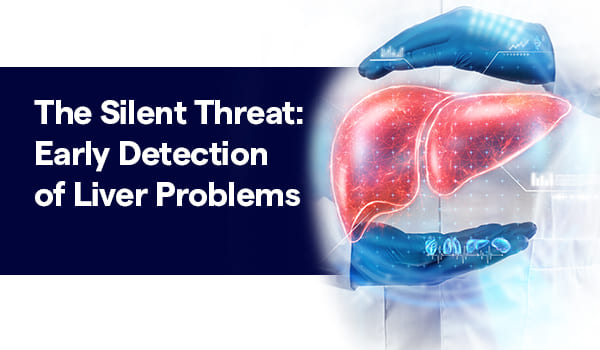Some prevalent symptoms of liver problems include jaundice (yellowing of the skin and eyes), abdominal pain and swelling, fatigue, nausea, vomiting, loss of appetite, and dark urine.
The following are the reasons for most liver problems in India:
Obesity and diabetes are two common conditions that are on the rise and have also been linked to the increasing incidence of non-alcoholic fatty liver disease (NAFLD). A study published in the journal Hepatology estimated that the global prevalence of NAFLD is around 25%, with the highest rates in Western countries. This disease is characterized by the accumulation of fat in the liver, which can cause inflammation.
Excessive alcohol consumption is another major risk factor that can cause liver damage. Excessive alcohol consumption is a major risk factor for liver damage. The National Institute on Alcohol Abuse and Alcoholism (NIAAA) reports that alcohol-related liver disease is one of the most common causes of liver problems. It is estimated to affect about 10-20% of heavy drinkers.
Hepatitis B and C are viral infections that contribute to liver problems. According to the WHO, approximately 257 million people worldwide are living with chronic hepatitis B infection, and around 71 million people have chronic hepatitis C infection. These viral infections can indeed lead to liver inflammation, scarring, cirrhosis, and liver cancer if left untreated.
Environmental factors such as exposure to certain toxins or medications can also contribute to liver issues. Certain chemicals and medications can indeed be toxic to the liver. For example, prolonged exposure to industrial chemicals like vinyl chloride and aflatoxins (produced by molds) can increase the risk of liver problems, including liver cancer.
Impact of Liver Problems on Overall Body Health
The liver's health is directly connected to the entire human body's well-being. When liver problems emerge, they affect various bodily functions, leading to profound consequences:
1. Metabolism and Nutrient Processing: The liver regulates metabolism, including glucose regulation, lipid metabolism, and protein synthesis. Impaired liver function can disrupt these processes, leading to metabolic disorders, malnutrition, and hormonal imbalances.
2. Detoxification: The liver filters toxins and waste products from the bloodstream, preventing accumulation. Liver problems impair detoxification, allowing the buildup of harmful substances that can affect brain function, digestion, and overall health.
3. Blood Clotting: The liver synthesizes clotting factors essential for proper coagulation. Liver problems may result in a decreased ability to clot blood, leading to increased bleeding and other related complications.
4. Immune System Function: The liver maintains a well-functioning immune system. Liver problems weaken the immune response, making individuals more susceptible to infections and diseases.
Pre-transplant Evaluation and Patient Selection
- Eligibility Criteria for Liver Transplantation
Not everyone is a suitable candidate for a liver transplant. Patients must meet certain eligibility criteria to undergo the procedure. Factors such as the severity of liver disease, overall health condition, absence of active infections or malignancies, and commitment to post-transplant care are considered. A thorough evaluation by a transplant hepatologist and a transplant surgeon from the liver transplant hospital in India is conducted to determine a patient's suitability for the transplant.
- Diagnostic Tests and Assessments
Various diagnostic tests and assessments are performed to assess the extent of liver disease and evaluate a patient's overall health. These usually include blood tests, imaging studies such as CT scans or MRIs, liver function tests, and sometimes liver biopsy. The results of these tests help the medical team make an informed decision about the need for liver transplant surgery and the appropriate course of action.
Different Types of Liver Transplants
- Deceased Donor Liver Transplant
In a deceased donor liver transplant, the liver is obtained from a brain-dead individual who has voluntarily chosen to donate their organs. This type of transplant is dependent on the availability of a suitable donor organ and the urgency of the recipient's condition. A highly coordinated effort is required for organ retrieval, transportation, and transplantation.
- Living Donor Liver Transplant
Living donor liver transplant involves the transplantation of a portion of a healthy liver from a living donor, often a family member or a close friend. This procedure is possible because the liver can regenerate and grow to its original size within a few months. A living donor liver transplant is considered a viable option when a suitable deceased donor organ is not readily available or when the recipient requires an urgent transplant.
Process and Surgical Techniques of Liver Transplantation
- Recipient Surgery
The recipient surgery involves removing the diseased liver and replacing it with the healthy donor liver. The surgical team carefully dissects the blood vessels and bile ducts of the recipient's liver while ensuring minimal bleeding and damage to surrounding structures. Once the donor's liver is implanted and connected to the recipient's blood vessels and bile ducts, the blood and bile flow are restored, allowing the new liver to function.
- Donor Surgery
Donor surgery is a complex procedure that involves removing a portion of the healthy liver from the living donor. The surgical team ensures the donor's safety and well-being throughout the process. The remaining liver in the donor regenerates over time, allowing them to return to a normal life after the surgery. Living donors require thorough evaluation and counseling before proceeding with the transplant to ensure their willingness and suitability for the procedure.
Post-operative Care and Complications
- Immunosuppression and Medication
After undergoing a liver transplant, one of the key aspects of post-operative care is immunosuppression. Since the recipient's immune system may recognize the new liver as a foreign object, medications are prescribed to suppress the immune response. These medications help prevent rejection and ensure the successful integration of the transplanted organ. It's all about striking a balance. While these medications reduce the immune response, they also increase the risk of infections. So, following the prescribed medication regimen and maintaining regular check-ups with your doctor becomes crucial.
For more information, book an appointment with Sir Ganga Ram Hospital.
